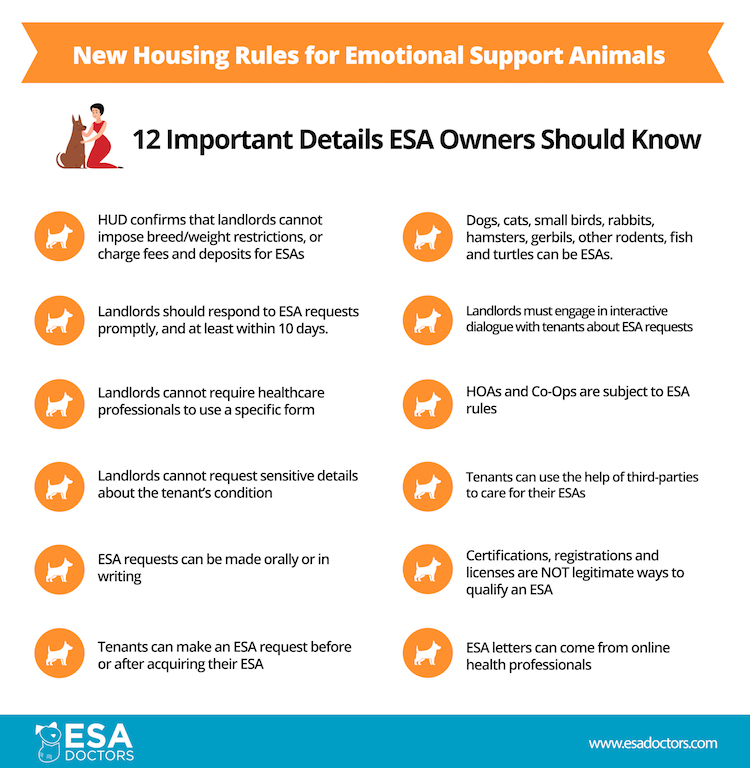

One Easy Quiz to Unlock Your Pet's Freedom?
.png)
What Is An Emotional Support Animal (ESA)

The Official ESA®: Trusted by Pet Parents Everywhere
Protect Your Fur Baby As An Official ESA® In 3 Easy Steps
Instant pre-approval, order the official esa®, doctor approval, official esa® protection coverage.

Official ESA®’s Love Their Freedom

Popular Questions About The Official ESA®
No. Because an emotional support animal is not a service animal, there are some limitations on where you can take it. Most businesses are legally permitted to deny entry of an ESA, while certified service animals are required to be allowed. However, if you contact the business ahead of time and communicate your situation, you may find that many are willing to make accommodations if possible.
Step 1: Take our quiz online to see if you qualify for an ESA Step 2: Order your pets' ESA for federal protections anywhere you live or move. Step 3: Your ESA request is review by a licensed doctor and approved within 24-48 hours
Yes, each ESA request is reviewed by a licensed doctor. Upon approval, you will be sent your ESA approval from the doctor in as quick as 24-48 hours. All ESA documentation includes the doctors full information and verifiable license number.
Our ESA Approvals are completely legal in all 50 states and comply under the FHA laws, and are accepted by nearly every Housing and College Campuses (dorms).
The Fair Housing Act (FHA) prohibits discrimination in housing, including that related to disability, race, religion, color, national origin, sex, and familial status. Anyone seeking to rent or buy a home, get a mortgage, or receive housing assistance is protected under the FHA. There are additional protections that apply specifically to federally-assisted housing.
Due to our thorough online qualifying process most ESA requests are fully approved by our network of doctors. If for any reason your ESA request is disapproved by the doctor, you will be refunded 100% of your money.How is this different from a service animal?
An emotional support animal provides love, affection, compassion, and support to a specific person with a diagnosed mental or emotional condition. They do not perform a specific task or job; instead, their purpose is to offer relief in challenging situations. A service animal assists a disabled individual, providing aid to people with visual impairment, mobility challenges, seizures, hearing loss, post-traumatic stress disorder (PTSD), and diabetes. Their role is to help their owner complete daily tasks, and many service dogs alert the owner in the event of an oncoming physical or emotional episode. Service dogs undergo intense training that enables them to help with specific functions, and receive special certification upon completion.
ESA approvals help people deal with symptoms like depression, anxiety, sleeplessness and things like PTSD through the special relationship they have with their pets. For many pet owners their animal helps them better deal with the stresses of life.
We have expedited processing options that will get you your full ESA Approval sent you electronically within 24-48 hours. Normal processing takes 3-5 days.
Yes, our ESA Approvals are completely legal in all 50 states and comply under the FHA laws, and are accepted by nearly every Housing and College Campuses (Dorms).
Still have questions call us expert team 7 days a week, toll free at: 1-855-700-7387

Certify Your Pet As An Official ESA® Today

Moving Tips & Moving Resources

Emotional Support Animal (ESA) Letter for Housing 101 Guide
Home » Moving » Emotional Support Animal (ESA) Letter for Housing 101 Guide
Jump Ahead To:
For many people struggling with mental health conditions, emotional support animals are an essential asset to their quality of life. Emotional support animals help people cope with a wide range of mental illnesses and emotional disorders. But what if you, as an emotional support animal owner, aren’t permitted to have your ESA live with you because your landlord doesn’t allow tenants to have pets? The good news is that there’s a straightforward way to protect your medical need for an emotional support animal, and it comes in the form of an official ESA letter .
Your emotional support animal does not require any special certifications (or even training) to fulfill its role of providing comfort and companionship, but you will need an official recommendation from a licensed medical professional to verify your need for its presence. Whether you’re hoping to move to a new home with your emotional support animal, or you’re simply wondering whether your current pet qualifies as an emotional support animal, there are a few things you need to know about ESAs, ESA letters, and housing .
Take this short quiz to see if you pre-qualify for an ESA.
Here’s the bottom line.

- What is an emotional support animal? An emotional support animal is a companion animal that helps its owner cope with mental health issues or emotional struggles . You don’t need to find a specially-trained dog to be an emotional support animal. Any pet that offers you emotional support can be an emotional support animal.
- Which animals are best as emotional support animals? Dogs and cats are the most common emotional support animals, but any animal can be an ESA as long as they provide their owner with emotional support and help them to cope with a mental or emotional condition.
- Why do tenants need an ESA letter? In the context of housing, ESA letters are used to show landlords that a licensed mental health professional has determined that you benefit from the companionship of an emotional support animal. Having a legitimate ESA letter ensures that you and your ESA will be allowed to live together in rented housing, even if your landlord typically has a “no pets” policy or charges pet deposits or fees.
- How to get an ESA letter: By working with an online ESA letter provider, you will be matched with a licensed medical professional. During an online consultation, this clinician will assess your mental health and determine whether you have a legitimate need for an emotional support animal. If so, they will write you an ESA letter that you can use for housing.
- Best ESA Online Providers: There are many trusted, well-known online providers of ESA letters, but unfortunately, there are a number of scam sites, too. The best companies have earned many positive reviews from their customers and offer a fast, transparent process to provide ESA letters to clients with legitimate mental health needs.
Read on to learn more about the role of emotional support animals, why tenants need an ESA letter, how to get an ESA letter, and which online ESA letter providers offer the best service.

What is an emotional support animal?
An emotional support animal offers comfort, love, and companionship to its owner. Some people struggle with day-to-day stress and anxiety, which can lead to more serious mental health issues. Many individuals with mental health needs benefit greatly from the emotional support of a companion animal, whether they are coping with a long-term mental illness or dealing with extreme stress and anxiety surrounding big life events, such as moving to another state or switching jobs. Regardless of whether an individual lives with daily mental health struggles or experiences sporadic episodes, a support animal can help.
For those planning to move with a support animal, here are some locations we service:
- New York City Movers
- Dallas Movers
- Boston Movers
- Philadelphia Movers
- Pittsburgh Movers
- Los Angeles Movers
- San Francisco Movers
- Washington DC Movers
- Charlotte Movers
- Las Vegas Movers
- Find Movers Near You
Also, if you are considering moving to another state, check out this quick guide on tips for moving company quotes.
There is no formal registration or licensing process for emotional support animals themselves. However, to prove to other people (including landlords) that your need for an ESA is legitimate, you will require a letter from a licensed mental health professional verifying this need.
Severe anxiety, panic attacks, and chronic stress are among the many emotional and mental conditions that can be eased by an emotional support animal.. A licensed therapist can help you determine whether you would truly benefit from the presence of an emotional support animal in your daily life. It’s also possible for a pet that you already own to be regarded as an emotional support animal – your therapist can make that judgment, too..
Which animals make the best ESAs?
The most common emotional support animals are dogs and cats. However, an emotional support animal can be any animal that offers comfort and companionship to a person in need. While you most commonly see emotional support dogs, there are many other animals that have successfully served as emotional support animals, including hamsters, rabbits, birds, hedgehogs, and even miniature horses and pigs. Any of these animals can help people to cope with a mental or emotional disability.
It’s important to keep in mind that although landlords will need to accommodate emotional support animals (as long as you have a valid letter), the accommodations should be reasonable. For example, if you want to live in a top-floor studio apartment, you probably can’t have a miniature horse live with you, even if they are considered an emotional support animal. A landlord is required to provide a habitable space , but ESA owners should also think logically and realistically about which space is best for them and their support animal.
Why do tenants need an ESA letter?

Many ESA owners who benefit from their animal’s companionship and emotional support may wonder why they need an official ESA letter as a tenant. An ESA letter for housing is essential for any ESA owner because the letter shows others that you have a legitimate medical need for your support animal – they are more than just a pet. An ESA letter will show that your animal plays a specific role in helping you cope with a mental health condition.
Because mental and emotional disabilities are often unseen, some people may dismiss them more easily than they would a cast on a broken arm or another physical injury. An ESA letter is the best way for ESA owners to show others that they have a medical need for their companion animal..
Even if they are less obvious to others, mental health struggles can be just as debilitating as physical ailments, and emotional support animals can help. Emotional support animals are essential for helping their owners cope with the daily occurrences and big events that cause stress and anxiety. Moving stress , changing jobs, or losing a loved one can significantly exacerbate everyday pressures and create a dangerous situation for someone who is already struggling with a mental health condition.
There are several important laws that protect ESA owners, especially when it comes to housing rules and landlords – as long as they have a legitimate ESA letter. Clearly, the process of getting an official ESA letter is of vital importance if you need to live with your emotional support animal in rented housing..
How to get an ESA letter
An ESA letter will prove incredibly useful when it comes to showing a landlord your medical need for an emotional support animal. If someone has an emotional support animal and they are asking for reasonable accommodations from their landlord, their landlord must respect the legitimacy of their ESA letter for housing.
There are a few steps to follow when getting an ESA letter. First, you need to find a reputable provider that can help you obtain an official ESA letter for housing. Getting your ESA letter online involves just a few simple steps, and you can complete the entire process from the comfort of your own home.
Take an online assessment
The first step is to explore your need for an ESA. Certain online services can help you with this step by offering an assessment that you can complete in your own time, at home. The assessment might take as little as three minutes. After you complete this assessment, you will most likely have a consultation with a medical professional.
Have a consultation with a licensed mental health professional
You’ll need to meet, talk on the phone, or have a video call with a licensed mental health professional to discuss your needs and concerns. You’ll need to be matched with a licensed mental health professional or therapist who is authorized to practice where you live, as ESA letter requirements stipulate that the health professional must be licensed in your state. During this consultation, your therapist will outline the best options for getting you help for your mental health needs. A mental health professional is the best person to determine whether an emotional support animal would be an asset to your treatment plan.

Get your letter
After your appointment with a mental health professional, they will decide whether you would benefit from the presence of an emotional support animal in your life. If your therapist decides that this is the case, they will issue you an official ESA letter. Your ESA letter will need to include certain information in order to be legally approved. Your letter needs to state your mental health clinician’s name, the name and phone number of their practice, the clinician’s license type and number, and when and where the license was issued.
The letter will also need a statement confirming that you need an emotional support animal. It must be written on official letterhead. If you use a legitimate, well-respected site like Pettable to help you get your letter, your therapist will know exactly what to include on your letter.
Best ESA Online Providers
The process of obtaining an ESA letter can seem overwhelming, but connecting with an experienced, trustworthy company will streamline the process significantly. We’ve selected a few of the best online ESA letter providers that can guide you through each step of the ESA letter process.
Connecting with an online ESA letter provider can be life-changing for people living with a mental or emotional disability. Having a mental health condition can cause anxiety, frustration, and fear, but an emotional support animal can help. Don’t hesitate to prioritize your health today.
- Easy online prequalification quiz
- Full money-back guarantee
- Fair Housing Act-compliant ESA letters
- Customer support, including email and phone assistance
- You can get your letter in as little as 24 hours after qualifying.
- You must provide an email address and phone number to complete the online prequalification quiz.
- You must pay in full before your consultation, but Pettable offers a 100% refund if you don’t end up qualifying for an ESA letter.
Pettable – The Bottom Line
Pettable has a very easy-to-use process that starts with a simple three-minute assessment about your ESA needs. Pettable will also set up an online consultation for you with a mental health professional who is licensed in your state. If you need a fast and incredibly reliable ESA service, Pettable is one of your best options.

Fast ESA Letter
- Easy three-step process to get an ESA letter
- Speak with a licensed mental health professional
- Fast ESA Letter sends ESA letters via email for easy downloading.
- You can receive a refund only under certain conditions.
Fast ESA Letter – The Bottom Line
Fast ESA Letter is a HIPAA-compliant online service that connects people in need of an ESA letter with licensed mental health professionals. Their process is simple and straightforward, although you may want to think carefully before committing, as refunds are only issued in limited circumstances.
Real ESA Letter
- Offers a free online assessment – no credit card needed
- Letters are written on official letterhead and signed by a licensed healthcare professional.
- You’ll receive a physical copy of your ESA letter by mail, along with your emailed digital copy.
- There are other services that send digital letters more quickly. Real ESA Letter sends digital copies within 48 hours.
- It’s difficult to find contact information for customer support on their website.
Real ESA Letter – The Bottom Line
Real ESA Letter offers legitimate ESA letters that comply with the Fair Housing Act, and they connect people with licensed mental health clinicians. Their letters are professionally written and legally compliant, although it can be difficult to access customer support if you encounter any issues.
ESA Benefits for Students
Pursuing higher education can be stressful , and having a pet to come home to can make a huge difference. There are also resources available for students who have emotional support dogs, or who just love dogs in general, like the scholarship below!
A Dog Changed My Life Scholarship
Has a dog been a special part of your life? Then there’s an annual scholarship just for you! The $500 annual A Dog Changed My Life Scholarship Scholarship was created to support those who love and have been moved by dogs, and who need little help in paying for their education or education-related expenses. The deadline for applications is August 15 of every year, with winners announced one month later on September 15.

The companionship of a dog is one of the most rewarding experiences in life. Dogs bring years of joy to individuals and families across the globe. Their unconditional love and support can truly change our lives.
This scholarship aims to honor our furry friends and their caring humans by awarding one student $500 to put towards their education.
Any high school senior, undergraduate, or graduate student who’s a US citizen or permanent legal resident and has been impacted by a dog may apply.
Any high school senior, undergraduate, or graduate student who is a US citizen or permanent legal resident and a lover of dogs is welcome to apply for the Dog Lover scholarship.
Just click to apply below and share why you love dogs and how a dog has changed your life!
- Amount: $500
- Application deadline: August 15
- Recurrence: Annual
Eligibility:
- Education Level: High school senior, undergraduate, or graduate student
- Citizenship: US citizen or permanent legal resident
- Background: Must love dogs!
- Latest Posts
- The 5 Best Neighborhoods in Saint Louis (Updated 2024) - March 15, 2024
- Is Moving to Pennsylvania Right for You? A 2024 Guide. - March 4, 2024
- The Best Neighborhoods in Cleveland (Updated 2024) - February 15, 2024

How It Works

with an Emotional Support Animal is your legal right!

an Emotional Support Animal is your legal right!
Everything you need to live and travel with your pet
* Companion Plan includes Housing ESA Letter + Air Travel ESA Letters and more
Live with your Pet
Live happily with your animal by your side at all times.
Travel with your Pet
Enjoy stress-free air travel with your ESA.
Money Back Guarantee
We are here to help! Contact support .
See if You Qualify for an Emotional Support Animal Today
Choose ESA Plan
Choose from Our Plans to get Your ESA Screening Test to Qualify.
ESA Evaluation
Speak with a Licensed Mental Health Counselor (LMHC) to Evaluate You for an ESA.
Receive Package
Your Custom Treatment Plan including ESA Letter will be sent if Qualified.
Enjoy Freedom
Enjoy Being Together with Your Furry Companion by Your Side, Every Step of the Way.

The Fair Housing Amendment Act States
FHAA requires that the housing provider make reasonable modifications in rules, policies, practices or services necessary to give persons with disabilities equal opportunity to use and enjoy the dwelling.
Allowing a tenant who is blind to have a guide dog even though the building has a no pet policy. This same rule would apply to individuals who need a service animal, emotional support animal or a therapy animal.
ESA Letter Pricing Plans
Housing esa.
- Confidential Evaluation
- ESA Letter for Housing * Digital documents
- ESAnimals Database Access * 24/7 Online Access
- Phone and Chat Support
Most Popular
Companion ESA
- ESA Letter for Air Travel * Digital documents
Air Travel ESA
Live happier with an emotional support animal.

- Licensed Mental Health Counselor Evaluation for ESA
- Don’t Live without Your Furry Companion
- LMHC Info Included in Documents
- Expeditied Order Processing Available
- © 2024 ESAnimals.com
- Terms & Conditions
Contact Customer Support

- Register Now
Understanding ESA Letters for Airlines & Housing

Emotional support animals (ESAs) play a crucial role in providing comfort, companionship, and emotional well-being to individuals with mental health conditions. Recognizing the importance of these animal companions, certain regulations and policies have been established to allow ESAs to accompany their owners in airlines and housing. In this blog, we will delve into the concept of ESA letters for airlines, their significance, and how they facilitate the inclusion of ESAs in air travel and housing arrangements.
What is an ESA Letter?
An ESA letter, also known as an emotional support animal letter or prescription, is a document provided by a licensed mental health professional (therapist, psychiatrist, or psychologist). The letter confirms that an individual has a diagnosed mental health condition and that an emotional support animal is an integral part of their treatment plan.
ESA Letters and Air Travel:
Airlines have specific policies regarding the accommodation of emotional support animals on flights. An ESA letter serves as the required documentation to inform the airline of the individual’s need for their animal companion during air travel. It grants the ESA owner the right to travel with their animal in the cabin, bypassing restrictions on pets or additional fees.
To obtain permission for air travel with an ESA, it is essential to provide the airline with a valid ESA letter. The letter should include the mental health professional’s credentials, their contact information, and confirmation of the individual’s need for an emotional support animal. It is advisable to contact the airline in advance to understand their specific requirements and guidelines.
ESA Letters and Housing:
The Fair Housing Act (FHA) in the United States protects individuals with disabilities, including those who require emotional support animals, from housing discrimination. An ESA letter is instrumental in exercising the right to live with an emotional support animal, even in housing that has pet restrictions or no-pet policies.
An individual seeking accommodation with their ESA must provide their landlord or housing provider with a valid ESA letter. The letter should include the mental health professional’s information, confirmation of the individual’s mental health condition, and the necessity of the emotional support animal as part of their treatment plan. This letter helps establish the individual’s right to live with their ESA without facing discrimination or additional fees.
Importance of Valid ESA letters for airlines:
Having a valid ESA letter is crucial for several reasons:
a. Legitimacy: An ESA letter serves as official documentation that validates the presence of an emotional support animal as part of an individual’s mental health treatment plan. It provides credibility and legitimacy to the need for an ESA.
b. Legal Protection: Under the FHA and Air Carrier Access Act (ACAA), individuals with valid ESA letters are protected from discrimination in housing and air travel. The letter affirms the individual’s rights and ensures compliance with legal requirements.
c. Accessibility: An ESA letter allows individuals to have their emotional support animals by their side, providing comfort and assistance in stressful or anxiety-inducing situations, such as air travel or residing in pet-restricted housing.
d. Avoiding Misrepresentation: A valid ESA letter helps distinguish between legitimate emotional support animals and pets. It prevents the misuse or misrepresentation of pets as ESAs, which can undermine the rights of individuals with genuine mental health conditions.
- Obtaining an ESA Letter:
To obtain a valid ESA letter, individuals can contact United Support Animals as they have a Network of licensed Mental Health Professionals and Medical Doctors across the United States who provide our members and customers with legal emotional support animal documentation via the most efficient and simple customer-friendly process.
Also they have a Network of licensed Mental Health Professionals and Medical Doctors that provide quick and confidential consultations to their members and customers.
Responsibilities of ESA Owners:
Owning an emotional support animal comes with responsibilities. As an ESA owner, it is important to:
a. Provide Proper Care: Ensure the well-being and proper care of your emotional support animal. This includes regular veterinary visits, appropriate nutrition, exercise, and grooming.
b. Training and Behavior: Train your ESA to be well-behaved, obedient, and socially appropriate. This helps create a positive environment and promotes the well-being of your animal companion.
c. Respect Rules and Regulations: Abide by the rules and guidelines set by airlines, housing providers, and public spaces when it comes to the presence and behavior of your ESA. It is crucial to respect the rights and comfort of others.
d. Maintain Documentation: Keep your ESA letter and other relevant documentation readily available in case you need to provide proof of your animal’s status.
United Support Animals – ESA letters for airlines
ESA letters play a vital role in recognizing the therapeutic benefits of emotional support animals and facilitating their inclusion in air travel and housing arrangements. By obtaining a valid ESA letter from United Support Animals , individuals can ensure their rights are protected and enjoy the companionship and support of their emotional support animals during their journeys toward improved mental well-being. To select a letter package call to see if you qualify at 800-918-3151 or do an online screening.
Related Articles

What Disabilities Qualify for an Emotional Support Animal?
You’ve likely heard of emotional support animals and maybe you are wondering if one would help you, or if you even qualify for one. Here are the...

Can Your Lease Be Canceled Because of Your ESA?
If you are looking into adopting an emotional support animal, you may be worried about your landlord kicking you out because of their no pet policy, o...

Can Emotional Support Animals Help Reduce Stress?
For many of us, stress permeates our everyday lives, causing symptoms such as headache, fatigue, racing heart, chest pains, insomnia, muscle ache, and...
USEFUL LINKS
- Terms & Conditions
- Return Policy
- ESA Registration
- Housing Letter
- Travel Letter
- SA Registration
- Letter Renewal
- Pre-Approval Screening
- [email protected]
- 800-918-3151
SECURE ONLINE SHOPPING
© Copyright 2020 by United Support Animals. All Rights Reserved. Privacy Policy
A United Support Animal's agent will contact you shortly.
- Mental Health Benefits
- Psychiatric Service Dog
- International Travel
- Theme Parks
- College Dorms
U.S. Department of Housing Issues New Rules for Emotional Support Animals

This article was last updated on October 20, 2023, to reflect the latest ESA developments. HUD’s 2020 guidelines for emotional support animals are still in effect and many states have also adopted their own laws, thanks to the continued advocacy for ESA owner rights.
On January 28 th , 2020, the U.S. Department of Housing and Urban Development (HUD) issued new guidance regarding Emotional Support Animals (ESAs) in housing. This is a major development for owners of ESAs and the first comprehensive update to ESA housing rules since HUD last issued guidance in 2013 .
If you are interested in learning more about how to get a legitimate Emotional Support Animal Letter so that you are protected by HUD, you may be interested in this article on how to get an ESA letter for housing .
12 Important Facts ESA Owners Need to Know
All owners of ESAs or prospective owners of ESAs should become familiar with these new rules, which are now in effect and replace the 2013 rules. This article addresses 12 important details about the new rules and is intended to help tenants understand their current rights as ESA owners.
- HUD confirms that landlords cannot impose breed/weight restrictions, or charge fees and deposits for ESAs
- Landlords should respond to ESA requests promptly, and at least within 10 days.
- Landlords cannot require healthcare professionals to use a specific form
- Landlords cannot request sensitive details about the tenant’s condition
- ESA requests can be made orally or in writing
- Tenants can make an ESA request before or after acquiring their ESA
- Dogs, cats, small birds, rabbits, hamsters, gerbils, other rodents, fish, and turtles can be ESAs.
- Landlords must engage in interactive dialogue with tenants about ESA requests
- HOAs and Co-Ops are subject to ESA rules
- Tenants can use the help of third parties to care for their ESAs
- Registrations and licenses are NOT legitimate ways to qualify an ESA
- ESA letters can come from online health professionals
First, some quick background, especially for those new to ESA housing laws. The Fair Housing Act is a federal law that makes it illegal for housing providers to refuse a reasonable accommodation that a person with a disability needs to have equal opportunity to enjoy and use a dwelling. Many individuals with mental health-related disabilities, including depression, anxiety, PTSD, and phobias, have Emotional Support Animals that provide comfort and relief from symptoms of their condition. In order to qualify an animal companion as an ESA, the owner must obtain a recommendation letter from a licensed health care professional (LHCP).
Tenants with ESA letters have certain rights under the Fair Housing Act:
- ESAs are permitted in almost every type of housing, even those with no-pets policies.
- ESAs are not considered normal pets under Fair Housing rules, and building policies that apply to pets do not apply to Emotional Support Animals. For example, landlords are not permitted to charge fees and deposits in connection with ESAs.
- Landlords also cannot impose breed or weight restrictions on ESAs.
The Department of Housing sets best practices for how ESA accommodations are handled. HUD notes that it was receiving an increasing number of complaints regarding how ESA accommodations should be handled. Tenants complained about landlords unfairly denying their requests, and landlords complained about confusion regarding how to properly handle tenant requests. In response to these complaints and uncertainty regarding ESA procedures, HUD has released brand new guidance to clarify the requirements for ESA accommodation.
For current ESA owners worried about whether their landlord may try to take away their ESA under the new rules, HUD makes clear that landlords cannot reassess requests for ESA accommodation that were granted prior to the issuance of the new guidance. Any ESA requests submitted to landlords after January 28, 2020, however, will be subject to the new HUD guidance. Current ESA owners should still become familiar with the new ESA rules that apply to them.
The good news for current and prospective ESA owners is that the new guidance provides some additional protections for ESAs and much-needed clarity for landlords and tenants. HUD’s new guidance also answers some questions many ESA owners commonly asked which did not previously have clear answers. Here are 12 facts every ESA owner should be aware of regarding the latest rules.
1. HUD confirms existing rights for ESA owners: No breed/weight restrictions, and no fees and deposits are allowed
In its latest guidance, HUD once again confirms that normal rules that apply to pets do not apply to ESAs. This means that landlords cannot place limitations on the size or breed of a dog used as an Emotional Support Animal. Landlords can only deny ESAs in limited circumstances, such as if there are specific issues with the ESA’s actual conduct that pose a direct threat to others, or if accommodation of the ESA would create a fundamental alteration to the landlord’s premises.
Under HUD guidance, landlords were also prohibited from charging fees and deposits in connection with ESAs. Even if a tenant’s building charged a monthly fee or deposit for regular pets, ESA owners are exempt from having to pay such costs. HUD has affirmed in its latest guidance that fees and deposits are impermissible and further clarified that landlords also cannot charge an application fee in connection with a tenant’s request for accommodation of their ESA.
A landlord can, however, charge a tenant for damage their Emotional Support Animal causes if it is the landlord’s customary practice to charge for damage caused by tenants. Landlords often complained about not being able to charge fees and deposits to cover potential damage that an ESA may cause, but HUD confirms that ESA owners are responsible for the actions of their ESAs and that landlords can also deduct costs associated with damage caused by an ESA from the standard security deposit charged to all tenants.
2. Landlords should respond to ESA requests within 10 days
In previous guidance, HUD stated that landlords could not “unreasonably delay” responding to ESA requests. This led to confusion about the exact time frame a landlord had to respond. Most landlords respond within a matter of days, but some prolong the process and tenants were uncertain about what their rights were if the landlord dragged their feet. HUD has thankfully clarified in its latest guidance that housing providers should respond “promptly, generally within 10 days of receiving documentation.” This gives some much-needed certainty to ESA owners who are anxiously waiting for their landlord to make a decision.
3. Landlords cannot require the health care professional to use a specific form or make unreasonable demands of them
One common complication that tenants seeking ESA accommodation run into is that landlords will insist that additional forms be completed by the health care professional in addition to the ESA letter they have issued. Landlords also sometimes impose other demands on the licensed professional, such as making sworn statements.
HUD, in its guidance, has stated that landlords cannot require a health care professional to use a specific form, provide notarized documents, make statements under penalty of perjury, or provide an individual’s diagnosis or other detailed information about a person’s mental impairments.
This is good news for tenants with landlords who require additional forms that demand invasive information about the tenant. Tenants may still choose to have their health care professional complete landlord forms that are merely confirmatory or that do not demand sensitive details about the tenant’s condition. Tenants are now protected, however, if their landlord oversteps their bounds and demands that the health care professional complete a form that is beyond the scope of Fair Housing rules.
HUD notes that it relies on licensed health care professionals to provide accurate information to the best of their personal knowledge, consistent with their professional obligations. Just as HUD defers to the determinations of licensed professionals, landlords should also rely on a licensed health care professional’s determination set forth in a compliant ESA letter without making additional demands for sensitive information or imposing additional requirements like sworn statements.
4. Landlords cannot request details about the tenant’s condition
Some landlords, during the ESA accommodation process, will demand to know more details about the tenant’s condition and why they need a particular ESA. HUD has emphasized once again that housing providers cannot request specific details regarding the tenant’s condition. Landlords cannot request access to medical records or insist on a medical examination. HUD states in its guidance that landlords are not entitled to know the tenant’s diagnosis and that landlords cannot require the disclosure of details about the severity of the tenant’s disability.
5. HUD has clarified how ESA requests should be submitted to landlords
Many ESA owners have questioned over the years how exactly they should submit their ESA letter to their landlord. HUD has clarified that tenants can make a request for accommodation of their ESA orally or in writing. The request can also be made directly by the ESA owner, or by someone else on behalf of the owner, such as a person legally residing in the unit with the ESA owner or a legal guardian or authorized representative. Tenants do not need to submit a written request or to use the words “reasonable accommodation,” “assistance animal,” or any other special words to request accommodation for their ESA.
It should be sufficient for a tenant to just let the landlord know they are requesting to live with their ESA and submit their ESA letter.
HUD does, however, encourage tenants to specify that they are requesting “reasonable accommodation” for an Emotional Support Animal in order to avoid any confusion regarding their request. HUD also recommends that tenants keep a copy of their accommodation request and any supporting documentation. These sensible tips from HUD will come in handy in case there is a dispute later with the landlord about whether an ESA accommodation request was ever made.
6. Residents can make an ESA request before or after acquiring the ESA
Another common question that prospective ESA owners ask is when they need to submit their ESA request to the landlord, and whether they can make a request if their ESA is already living with them. HUD has clarified that tenants can request ESA accommodation either before or after acquiring their Emotional Support Animal.
HUD states in its guidance that a person with a disability can make a reasonable accommodation request at any time, and the landlord must consider the request even if the tenant made the request after bringing the ESA into their home.
We always recommend that ESA owners be fully transparent with their landlords about their ESA situation and let their landlords know as soon as possible if they are obtaining an ESA. Sometimes landlords find out that a tenant has been keeping an ESA in secret and threaten to kick out the ESA or terminate the tenant’s lease. HUD has stated that in these situations, the tenant can still submit an ESA request, but the timing may create the impression that the tenant acted in bad faith (i.e., the tenant obtained an ESA solely to skirt pet rules). That means a couple of things: First, if you think you may qualify for an ESA, you should seek help from a licensed professional as soon as possible, and not only after you bring an animal home and your landlord discovers it. Secondly, you should always try, when possible, to inform the landlord prior to the ESA moving in. That is not always feasible – for example, if you already live with a pet and then that pet later qualifies as an ESA.
The bottom line is that you should never try to hide an ESA from a landlord, and ESA owners should submit a request for ESA accommodation as soon as they qualify for an ESA letter. You can also submit the request to your landlord prior to actually adopting the animal that will become your ESA.
7. HUD clarifies what type of animals can qualify as ESAs
Emotional Support Animals are most commonly dogs and cats, but many types of animals can serve as wonderful companions that provide emotional support. HUD, in its guidance, clarifies that any “small, domesticated animal that is traditionally kept in the home for pleasure rather than for commercial purposes” can be an ESA. Dogs, cats, small birds, rabbits, hamsters, gerbils, other rodents, fish, and turtles are given as specific examples of animals that fall into this category.
This does not mean that other animals cannot serve as ESAs. The HUD notes that other “unique” animals, such as reptiles other than turtles, barnyard animals, monkeys, kangaroos, and other non-domesticated animals, will face a higher bar in order for landlords to accept them. HUD notes that owners of such “unique” animals will face the substantial burden of demonstrating the need for such animals, and should submit additional documentation from their health care professional specifically confirming the need for the animal. In these cases, the health professional will have to describe the unique circumstances that justify the client’s need for the particular animal.
8. Housing providers must engage in dialogue with their tenants about ESA accommodation requests, and also explore other options if the request is denied
Sometimes, tenants face an unfortunate situation where their landlord refuses to consider their request for an ESA, denies an ESA without giving the reasons why, or just refuses to discuss the matter at all. HUD has stated in its new rules that before denying a reasonable accommodation request due to a lack of information about a tenant’s disability or their ESA, the housing provider should “engage in a good-faith dialogue” with the tenant, referred to as the “interactive process.”
Landlords have to give the tenant a “reasonable opportunity” to provide documentation regarding their ESA before rejecting the tenant’s request.
The landlord should let the tenant know why they believe the tenant’s ESA request is insufficient, and engage in a good-faith dialogue to remedy the situation. If the landlord is refusing reasonable accommodation for an ESA because they have determined the particular ESA poses a direct threat, the landlord must also have considered whether there may be actions to eliminate or reduce that threat to an acceptable level through actions the tenant takes to maintain or control their ESA. HUD gives as an example the tenant possibly keeping the potentially threatening ESA in a secure enclosure.
9. HOAs and Co-Ops are subject to ESA rules
It was generally understood that HOAs and co-ops were subject to the same Fair Housing rules as other types of housing. However, tenants would sometimes face challenges dealing with difficult HOAs and co-ops.
For the avoidance of doubt, HUD has stated that a reasonable accommodation for an ESA may include a reasonable accommodation to a land use and zoning law, homeowners association rule, or a co-op rule.
10. Tenants are responsible for the well-being of their ESAs, and can also utilize others to help care for the ESA
It probably goes without saying, but an ESA owner is always responsible for the well-being and safety of their ESA, as well as for any consequences that stem from their ESA’s actions. HUD reminds ESA owners in its updated guidance that tenants with ESAs are responsible for feeding, maintaining, providing veterinary care for, and controlling their Emotional Support Animal.
HUD also clarifies that the tenant can do this on their own, with the help of family and friends, or with other third parties like volunteers or service providers.
This guidance is helpful for ESA owners who have had landlords suggest that the ESA must be in their complete control at all times. HUD recognizes that ESA owners, like most pet owners, will utilize third parties from time to time to care for their animal companion.
11. Registrations and licenses are NOT legitimate ways to qualify an ESA
We have written many articles and cautioned numerous people over the years that the only way to legitimately qualify an animal companion as an ESA is to obtain an ESA letter from a licensed health professional. Websites that sell registrations and licenses for a fee are not providing effective ESA services.
ESAs do not need a registration or license, and these items also do not confer any legal rights on an animal or confirm the owner has a disability.
HUD makes clear in its guidance that these types of documents purchased online are insufficient to demonstrate to landlords that a tenant has a disability that requires an ESA. We applaud HUD’s efforts to crack down on websites that sell dubious ESA services and ineffective products. We also warn clients against companies that sell ESA letters without the involvement of a licensed professional – these types of letters are also invalid.
HUD recommends that the health care professional sign and date any documentation provided and provide contact information and professional licensing information in the ESA letter. We have always connected clients to licensed professionals who provide ESA letters on their signed letterhead, with their contact information and professional licensing information included. We are glad to see HUD has clarified that ESA letters should always meet that minimum standard.
12. HUD clarifies that ESA letters can come from online therapists
We routinely emphasize to prospective ESA owners that ESA letters must come from a licensed health care professional, and HUD again confirms that requirement in its latest guidance. HUD specifically states that ESA documentation must come from a licensed health care professional. HUD has provided as examples of LHCPs the following professionals: psychologists, psychiatrists, optometrists, physicians, physician’s assistants, nurse practitioners, nurses, social workers, and other mental health professionals. Landlords will sometimes insist that an ESA letter must come from a physician – that is untrue according to HUD’s guidance.
At ESA Doctors , clients are always connected to professionals who are licensed for their state. The licensed health care professionals that ESA Doctors work with make recommendations for ESAs based on their independent professional judgment.
HUD notes that a legitimate licensed health care professionals can deliver ESA-related services remotely, including over the internet.
This clarification from HUD is a major win for individuals who are not able to see a therapist in person. Many people, for financial or other reasons, are unable or unwilling to seek help in person, and online services provide an invaluable resource for this underserved population.
HUD’s Guidance Affirms the Importance of ESAs and the Need to Protect ESA Owners in the Home
In its recent guidance, HUD recognizes the crucial role that Emotional Support Animals can have in the lives of their owners. Some examples that HUD gives of how assistance animals help owners with mental illness include:
- Providing emotional support that alleviates at least one identified symptom or effect of a mental impairment
- Taking action to calm a person with post-traumatic stress disorder (PTSD) during an anxiety attack
- Assisting the person in dealing with disability-related stress or pain;
- Assisting a person with mental illness to leave the isolation of home or to interact with others
- Enabling a person to deal with the symptoms or effects of major depression by providing a reason to live
If you are a current ESA owner or are seeking to qualify to become one, it is important to understand your rights under federal law when it comes to housing. HUD’s 2020 guidance provides much-needed clarity on many ambiguities that existed when it came to how ESA requests should be processed under Fair Housing rules. It is important to note that HUD has warned the public against ESA services that sell certifications, licenses, and registrations. HUD emphasizes that legitimate ESA letters must come from a licensed health care professional.
If you believe you have a mental illness or are suffering from emotional distress and are interested in seeing if you may qualify for an ESA, we always recommend seeking the help of a qualified licensed health care professional. If you do not have a health care professional, are having trouble finding one, or do not have the ability to see a professional in person, we can help connect you to a health care professional licensed for your state who can help evaluate whether an Emotional Support Animal may be appropriate for you.
Note that these HUD guidelines are applicable in every state, but many states have adopted their own ESA rules. These rules can sometimes have some unique wrinkles in the ESA process. For example, in California and Arkansas , if you are seeing a therapist or doctor for the first time, they must have a relationship with you for at least 30 days before they can give you an ESA letter.
If you’re planning to get an ESA letter, please keep in mind that your state can have specific requirements. If you need to find a licensed healthcare professional for an ESA letter, ESA Doctors can connect you with someone knowledgeable about all the latest requirements for your state.
Below is a recap of the 12 important details regarding the updated Fair Housing rules
If you found this article helpful, you may be interested in saving the graphic below or sharing it with a loved one who may be impacted by these changes.

Share this image on your site (copy code below): <div style="clear:both"><a href="https://esadoctors.com/hud-housing-rules-emotional-support-animals/" target="_blank"><img decoding="async" style="max-width:100%;margin:0 0 10px;" src="https://esadoctors.com/wp-content/uploads/2020/02/Fair-Housing-for-Emotional-Support-Animals-1.jpg" title="New Housing Rules for Emotional Support Animals" alt="12 facts ESA owners need to know about the new U.S. Department of Housing Rules" border="0" data-src="" /></a></div> Copy

About the Author: The ESA Doctors writing team has extensive experience relating to disability and housing laws, mental health, animal training, and pet health. Each article is fact checked and reviewed by multiple members of our team. Many of the writers have emotional support animals and speak from real life experiences.
Share This Story, Choose Your Platform!
Related posts.

Ohio Emotional Support Animal Laws

Illinois Emotional Support Animal Laws

Florida Emotional Support Animal Laws

What is the Air Carrier Access Act?

Montana Emotional Support Animal Laws
304 comments.
Under HUD standards and rules and regulations can my landlord deny my ESA because it is not neutered or spayed ?
That is not one of the approved reasons for denying an emotional support animal under HUD’s latest set of guidelines.
Save my name, email, and website in this browser for the next time I comment.
Qualify for a legitimate ESA letter or 100% money back
Qualify or 100% money back!

- free esa assessment
- who qualifies?

- Assessment Completed?
Quickly & Easily See if you Qualify for an Emotional Support Animal
Therapy pet helps people get the proper documentation to make their pet an official emotional support animal.
Instant Screening
- No More Unfair Pet Deposits
- Avoid Breed and Size Restrictions
- No More Unfair Airline Fees
Our Simple Process

What is the Purpose of an ESA Letter?
The purpose of an emotional support animal letter is to make the special bond between people and their therapy pets even stronger. Many different factors can lead to symptoms such as depression, anxiety, sleepless nights, PTSD etc. The bond people have with their emotional support animal dogs and other animals can be very important in helping to ease the symptoms of those conditions. At Therapy Pet, the goal is to improve the lives of people by making sure they get to live and travel with their therapy pets, who can be essential in the persons comfort and well-being.
ESA's Can Help In Many Ways:
- Feel Better
- Sleep Better
- Feel More Confident
- Better Overall Well-being
- Feel More Comfortable
- Increased Self-Esteem
Getting an ESA Qualification Has Never Been Easier
Click Below To Qualify
Customer Service Email: [email protected]
Customer Service Phone: (888) 608-5126
Customer Service Hours: 8am to 10pm EST (7 Days a week)
888 Prospect St Suite 200
La Jolla, CA 92037
How Do You Get an ESA Letter for Housing?
by Adopt a Pet , | January 8, 2024
To get an emotional support animal (ESA) letter for housing, you must ask your licensed therapist or other medical professional to write one for you.
Why You Need An ESA Letter
While emotional support animals do not enjoy the same broad protections as service animals, there are two areas in which they are protected: housing and airline travel. Having a letter ensures that you’ll be able to meet the requirements to have no-pet policies waived and to find rental housing and bring your ESA on a plane with you.
Some landlords may not require the letter, but it’s better to have it just in case. For airline travel, all airlines require an ESA letter and some may even ask for vaccination records and other paperwork.
If a landlord refuses to rent to you once you’ve shown him your ESA letter, he is in violation of the law and you can file a complaint with HUD. Most rentals are included, but there are a couple of exceptions:
Single family homes rented out without the help of a realtor.
Buildings with four units or less in which the landlord lives in one.
It is also of note that the landlord is not allowed to charge you a pet fee for your ESA even if other tenants are required to pay a pet deposit. You can, however, be charged for any damage caused by your ESA.
It shouldn’t be difficult to find a rental just because you have an emotional support animal, and the law is on your side. Know your rights, secure your letter, and you should have no problem finding the perfect rental.
Adopt a Pet
- Therapist Login
- --> Additional Doc umentation -->